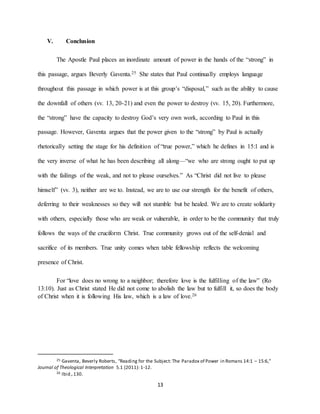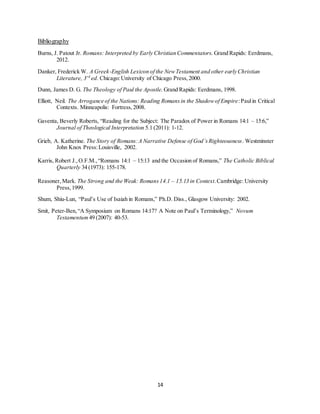Paul addresses issues that have caused division in the church in Rome regarding differing practices related to eating. Some only ate vegetables while others ate all foods. Paul argues that both groups should accept one another without judgment. Each believer lives by the measure of faith given by God and will answer to God alone, not other believers. The goal is unity in Christ, achieved through mutual acceptance rather than condemnation over disputable matters.
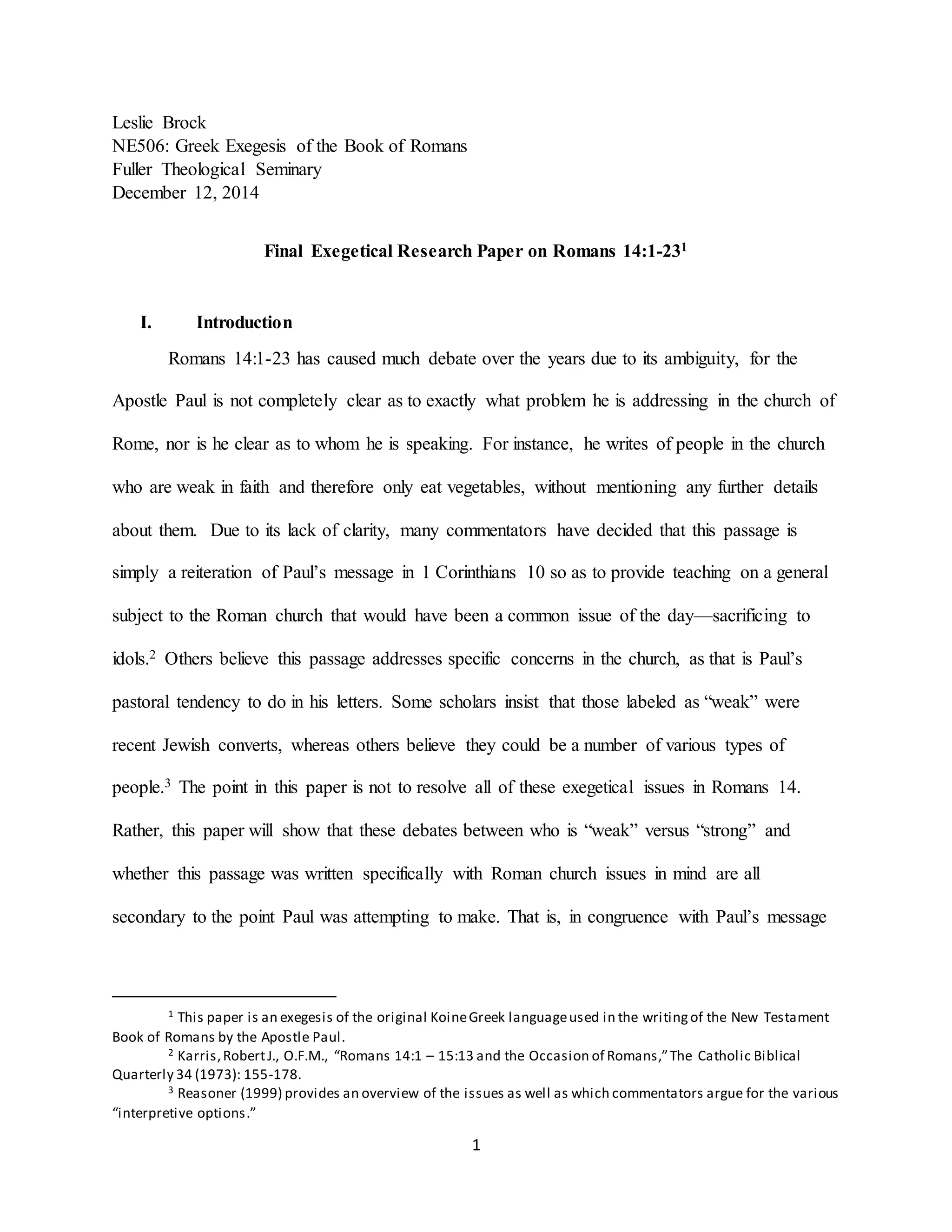
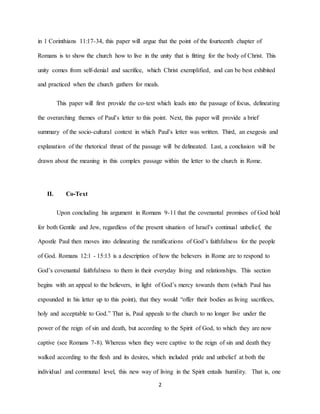
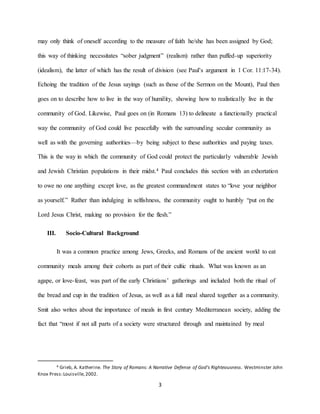
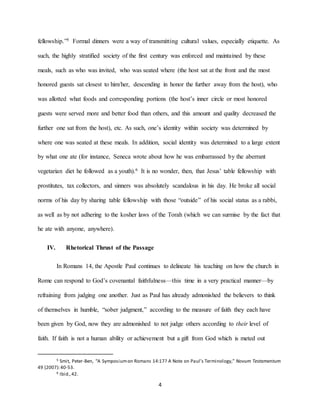
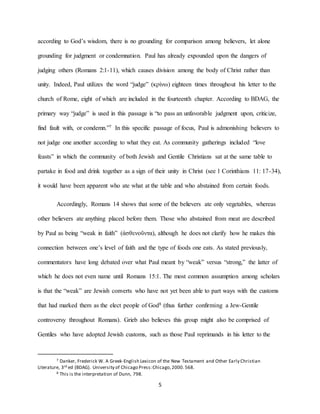
![6
church in Galatia9 (although, if that is the case, he certainly reacts to those believers differently
than he does to these in Rome!). Nonetheless, Dunn defines “weak in faith” as a “failure to trust
God completely and without qualification… [where this trust] leans on the crutches of particular
customs and not on God alone, as though they were an integral part of that trust.”10
What is significant is the fact that Paul never actually identifies those who are “weak”
and those who are “strong,” although he does place himself into the category of “strong” (15:1).
Reasoner argues that these two binary categories Paul uses are “designations of social status” in
first century Rome which fits into the strict imperial hierarchy of that time.11 Elliott states that,
“the label ‘weak’ in Romans 14 was a contemptuous term wielded in the larger status-conscious
Roman society against those who displayed excessive scrupulosity, especially if they belonged to
a foreign cult.”12 By using these labels, Paul is using categories of status with which his readers
would have been familiar. Additionally, Paul is setting the stage for his teaching on self-denial,
sacrifice, and humility for the sake of unity in the community, for he takes the side of the “weak”
and admonishes the “strong.” Not once does he describe the ascetic behavior of the “weak” as
something that is prohibited by God; rather, he continually prohibits the “strong” from asserting
themselves over the vulnerable group. Likewise, Paul does not go so far as to label who exactly
is in which group, the naming of which would create further divisions among the church, nor
does he elaborate on the causes of differing perspectives within the church of Rome. Rather, as
9 Grieb, 126.
10 Dunn, 798.
11 Reasoner, 50.
12 Elliott,Neil. The Arrogance of the Nations: Reading Romans in the Shadow of Empire: Paul in Critical
Contexts. Minneapolis:Fortress,2008.151.](https://image.slidesharecdn.com/94c1c2aa-24e1-420c-b2b4-a267c931b74b-150608202220-lva1-app6892/85/Brock_writingsample-6-320.jpg)
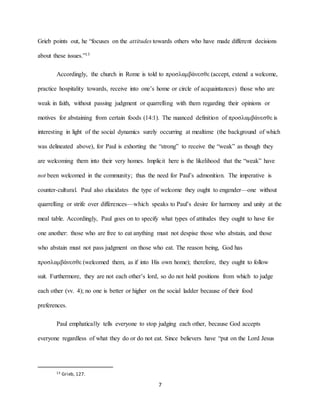
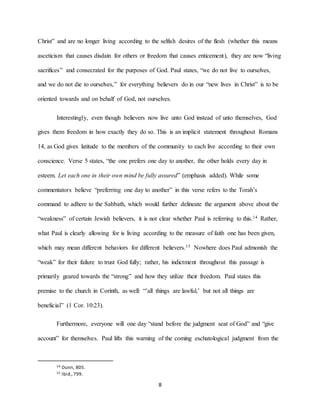
![9
oracles of the prophet Isaiah, who wrote, “As I live, says the Lord, every knee shall bow to me,
and every tongue shall give praise to God” (Is 45:23). In this OT text, argues Shum, “emphasis is
clearly put on human reverence and praise to God… however, in Rom. 14:11 God’s just
judgment over human deeds is underscored as a reminder to Roman Christians that they have no
right at all to pass judgment upon their fellow-believers.”16 This is underscored by the fact that
they all have only one Lord, the Creator of heaven and earth—so, “who are [they] to pass
judgment on servants of another?” Are they God (Paul intimates)?
As Paul has been referring to the traditional Jesus sayings to provide practical guidance
for the believing community of Rome (see Romans 12), it is no doubt he is thinking of the
following when he warns his readers of the coming judgment seat of God: “Do not judge, so that
you may not be judged. For with the judgment you make you will be judged, and the measure
you give will be the measure you get” (Mt 7:1-2). This thought echoes his previous warning for
judging others, placed closer to the beginning of his letter (Romans 2), which states that those
who judge others are passing judgment on themselves because they do the same things which
they condemn others for doing. This passing judgment on themselves is an indication of storing
up wrath “on the day of wrath when God’s righteous judgment will be revealed” (Ro 2:5). No
one will be spared God’s judgment on that day, regardless of food, drink, circumcision, or any
other matter, “for God shows no partiality” (Ro. 2:11).
Using the preposition οὖν (“accordingly”) to connect the coming judgment of God with
his subsequent thought, Paul then provides an alternative action (“but rather,” ἀλλὰ τοῦτο) to
judging others: believers are to actively decide to not place any possible mechanism of offense or
16 Shum, Shiu-Lun, “Paul’s Use of Isaiah in Romans,” Ph.D. Diss.,GlasgowUniversity:1999.250.](https://image.slidesharecdn.com/94c1c2aa-24e1-420c-b2b4-a267c931b74b-150608202220-lva1-app6892/85/Brock_writingsample-9-320.jpg)
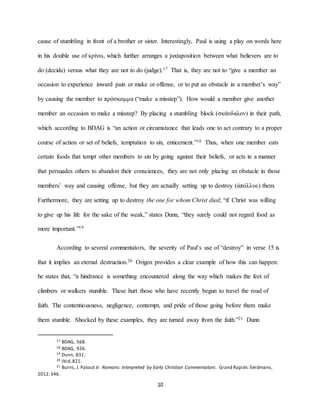
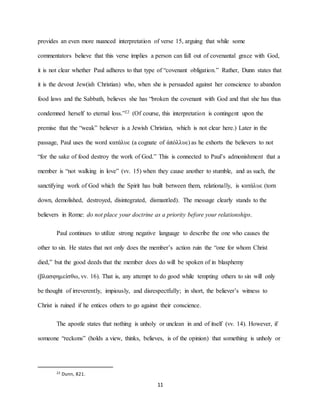
![12
unclean, it is unholy or unclean for that person. Therefore, if someone in the body of Christ
considers meat or wine to be unholy or unclean, they must abstain in good conscience, as should
other members of the body so as to not tempt those in abstention. By denying themselves of what
they could eat or drink on good conscience, they are creating solidarity with their “weaker”
brothers and sisters, and walking in love.23
Paul reminds his readers that the kingdom of God is about righteousness and peace and
joy in the Holy Spirit, not about who is free to eat or drink whatever they desire.24 When
members of the body of Christ live out of the place of righteousness, peace, and joy, both God
and onlookers approve (the opposite of blasphemy, vv. 16). Therefore, states Paul, “let us pursue
peace and that which edifies [builds up] one another,” which is juxtaposed with his warning
against destroying or tearing one another down (vv. 15). If someone has sufficient faith in which
she is free in conscience to eat or drink whatever she chooses, she ought to keep that secretly
between her and God, not bragging or lording it over others who do not feel such freedom. But
the person who has doubts about whether he should eat or drink something is condemned if he
eats, because he is not acting according to the measure of faith he has been given, “for whatever
does not proceed from faith [trust, belief, conviction, good conscience] is sin.” Therefore, rather
than either judging those who abstain or tempting them to go against their beliefs, Paul
admonishes those of us “who are strong to bear with the failings of the weak, and not to please
ourselves” (Ro 15:1).
23 Grieb, 129.
24 Ibid.,129.](https://image.slidesharecdn.com/94c1c2aa-24e1-420c-b2b4-a267c931b74b-150608202220-lva1-app6892/85/Brock_writingsample-12-320.jpg)
